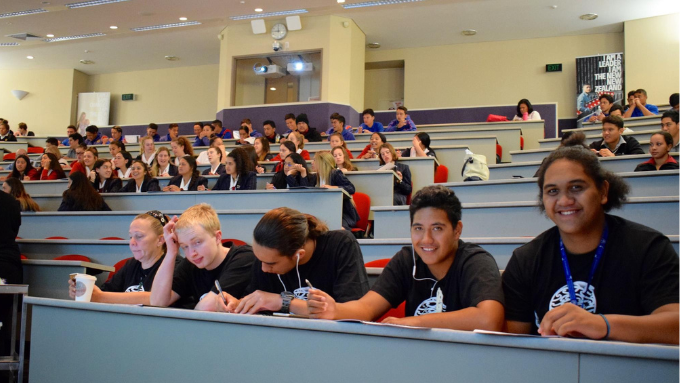A by-Māori-for-Māori organisation, Pūhoro largely works with non-Māori organisations to disrupt the narrative that Māori youth can’t participate and succeed in STEM. They set the foundation for collaborating with partners through their Mana Ōrite agreement, a Tiriti Relationship Agreement where all parties aspire to create a future that benefits rangatahi Māori, STEM professions, and Aotearoa. Their industry partners and groups actively participate in the academy, walking alongside the youth from Year 11, through tertiary and into internships or full-time paid work.
“Young people transition into jobs that are like their parents, or their parents’ social network. For some Māori, this means generations of freezing workers or labourers. The Pūhoro Academy is driven by a whānau approach and one benefit of that is their social network expands to include mentors, leaders and friends in STEM pathways,” says Naomi Manu.
Pūhoro youth are five times more likely to transition to tertiary schooling at degree level than other Māori school leavers.
“Already Pūhoro is seeing changes in terms of equitable access to STEM education. We have young Māori on a trajectory into high value careers,” says Naomi Manu.
Pūhoro facilitates a summer research scholarship programme that has created almost 90 internship placements within STEM industry research organisations. The trust delivers workshops that support the youth to transition to work, addressing issues such as being the only Māori in a research team. Likewise, Pūhoro delivers workshops to supervisors to ensure they understand their responsibility to be good supervisors have have pathways attractive to youth.
Dr Mark Tunnicliffe of Massey University says, “As an engineer, who has come back to academia, working with the students and staff in the Pūhoro STEMM Academy has been one of the most positive learning experiences in my life.”
It’s also a powerful experience for staff. “Not only do staff feel honoured to be part of something that helps rangatahi reach their aspirations but they themselves feel a deep sense of belonging and ownership over the work we do,” says Naomi Manu.
“We ensure that our values are woven throughout our organisation and govern our behaviour,” she says.
During the establishment phase of the Pūhoro Charitable Trust, Pūhoro relied on the work of Professor Jarrod Haar, who undertook research into kaupapa Māori Human Resource Management. Pūhoro ensured that their kaupapa Māori values guided the development and implementation of employment agreements, as well as all policies and procedures (HR, finance, health and safety). This ensured that Māori cultural values and beliefs influenced design and implementation of policy and procedure.


